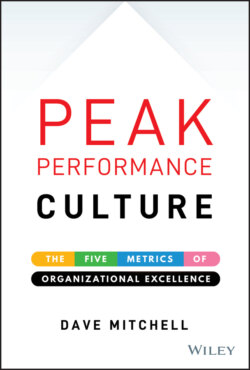Читать книгу Peak Performance Culture - Dave Mitchell - Страница 13
DESIRE VERSUS PASSION
ОглавлениеDesire is plentiful in the moment a business begins. The birth of a business is often the result of desire overcoming fear. Starting a business is scary. Risk is high. Rewards are not guaranteed. For a company to exist at all, there was a moment when the desire to create it outweighed the daunting barriers that could – likely would – undermine success. Sure, some businesses begin with ample money and clear advantages. But I'm not talking about those exceptions. I'm talking about the organizations that began with the desire of a single or small group of risk‐takers with a vision or, at least, a dream.
These organizations often fail. They fail because running a successful company is hard. Often, the mindset that leads to excellence is also the type of mind that thinks critically; and when you think critically, you continually see problems to solve. While that is an exceptional perspective for continuous improvement, it ensures that you won't relax much, sleep well, or truly ever be completely satisfied. It takes a special quality to propel an individual through the ongoing challenges, setbacks, and uncertainty involved in succeeding. Many start strong, and even achieve success, only to slowly lose their edge (their passion) and watch the organization slide back to mediocrity or worse. Desire most often succumbs to weariness.
There are currently around 150 wineries in the Walla Walla Valley wine region where I live. The Walla Walla Community College's vinicultural and enology program is full of students with dreams of being the next successful winemaker, owner, and/or vineyard manager. Armed with a desire to do the hard work that it takes to succeed in this highly competitive space and the knowledge of how to make wine, they will arrive within a market saturated with competition. To succeed, they work long, arduous days to make, promote, and sell wine. And most will fail.
Desire can get you started. It can even make you successful. But desire is not an infinite vessel of motivation. Desire drains. Desire without joy is not passion.
Family‐owned businesses provide an excellent illustration of the difference between desire and passion. There is a belief related to family‐owned businesses that the third generation will kill the company. “Shirtsleeves to shirtsleeves in three generations” the saying goes. Working in numerous industries that are populated by family owned businesses, I have seen it firsthand. Generally, the business is founded by a passionate person who works hard, struggles, fights off the adversity, and succeeds using the foundation of passion. They channel their joy into action that endures. The second generation – a daughter or son who has witnessed this epic undertaking – brings fresh ideas, technologies, and, especially, passion to the battle. Often, the company becomes bigger, even more successful, and high performing during this time when both joy and endurance exist to create passion. The second generation saw the original passion and the demands created by the struggle for success. They “caught the bug,” as one father explained about his daughter's success with the family business.
Finally, a third generation enters leadership. This individual did not experience or observe the original struggle. They are not aware of how big a role joy played in creating success. While they may have the desire and work ethic necessary to succeed, they don't possess the passion that began and perpetuated the company. They ascend to leadership due to birthright, not because of joy in action. It is not an indictment of the grandchildren's talent or ability, but rather evidence of how necessary passion is when building and sustaining a success.
